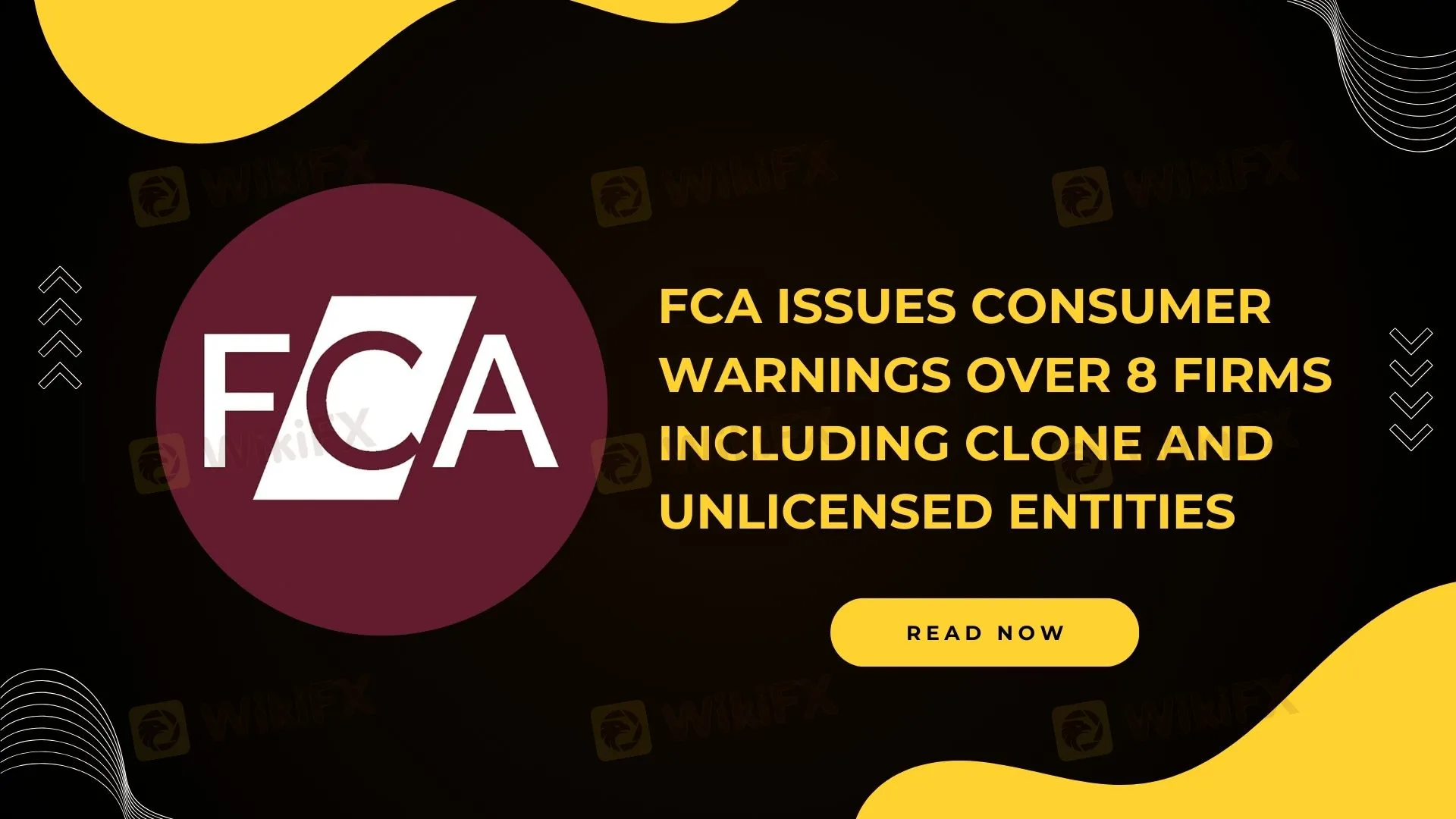简体中文
繁體中文
English
Pусский
日本語
ภาษาไทย
Tiếng Việt
Bahasa Indonesia
Español
हिन्दी
Filippiiniläinen
Français
Deutsch
Português
Türkçe
한국어
العربية
FCA Issues Consumer Warnings Over 8 Firms Including Clone and Unlicensed Entities
Abstract:The UK regulator has identified eight firms using deceptive tactics, including fake credentials and copycat websites, to offer unauthorised financial services to the public.

The UK Financial Conduct Authority (FCA) has issued a set of warnings against eight firms found to be offering financial services in the UK without proper authorisation. Among the entities flagged are both unlicensed operators and so-called “clone firms,” which fraudulently impersonate legitimate, FCA-authorised businesses to deceive consumers.
According to the FCA, clone firms are particularly deceptive because they often use names, addresses, registration numbers, or email domains that closely resemble real firms. In some cases, scammers may even direct consumers to fake websites that appear professional and legitimate. Once contact is established, victims are typically persuaded to transfer funds, thinking they are dealing with a regulated company.
The eight companies named in the latest warning include:
- Premium Loan / premiumloans.org – Clone of Premier Loans Ltd
- foundingassetmgt.com – Clone of Founding Asset Management Limited
- Believe Loan / believeloan.co.uk – Unauthorised lender
- RENDELMAN-JENNINGS CORPORATE LLC – Unregistered firm operating internationally
- Solpension AI / webtrader.solpension.co – Unlicensed platform promoting investment products
- Gavel Trades / gaveltrades.com – Unregulated financial platform
- Audacity Capital / audacitycapital.trade – Unauthorized trading website
- SONIX / sonixtrades.org – Platform offering services without FCA oversight
These firms, often appearing credible at first glance, commonly advertise through search engines, social media, or unsolicited emails. Their tactics may involve high-pressure sales techniques, guarantees of unrealistic returns, or limited-time offers meant to push users into rapid decisions. Once an investor transfers funds, it becomes exceedingly difficult to recover the money—especially when the firms operate offshore or lack any physical presence in the UK.
The FCA reminds consumers that dealing with unauthorised firms comes with significant risk. Victims of scams involving such entities are not eligible for support from the Financial Ombudsman Service or the Financial Services Compensation Scheme (FSCS), meaning financial losses are often irreversible.
Furthermore, the FCA urges financial professionals, journalists, and digital advertisers to remain vigilant and to report any suspicious platforms that may be misleading investors. The rise in clone firm activity also underscores the importance of digital literacy and fraud education as tools for investor protection.
Disclaimer:
The views in this article only represent the author's personal views, and do not constitute investment advice on this platform. This platform does not guarantee the accuracy, completeness and timeliness of the information in the article, and will not be liable for any loss caused by the use of or reliance on the information in the article.
Read more

Never Heard of Dynasty Trade? Here's Why You Should Be Worried
Have you heard this name before? No , it’s time you do because staying unaware could cost you. This platform is currently active in the forex trading and has been linked to several suspicious activities. Even if you’ve never dealt with it directly, there’s a chance it could reach out to you through ads, calls, messages, or social media. That’s why it’s important to know the red flags in advance.

Want to Deposit in the EVM Prime Platform? Stop Before You Lose It ALL
Contemplating forex investments in the EVM Prime platform? Think again! We empathize with those who have been bearing losses after losses with EVM Prime. We don't want you to be its next victim. Read this story that has investor complaints about EVM Prime.

WEEKLY SCAM BROKERS LIST IS OUT! Check it now
If you missed this week's fraud brokers list and are finding it difficult to track them one by one — don’t worry! We’ve brought together all the scam brokers you need to avoid, all in one place. Check this list now to stay alert and protect yourself from fraudulent brokers.

Catch the Latest Update on BotBro & Lavish Chaudhary
BotBro, an AI-based trading platform, became popular in India in 2024—but for negative reasons. Its founder, Lavish Chaudhary, who gained a huge following by promoting it heavily on social media. Since then, he has become well-known, but for many controversies. Let’s know the latest update about Botbro & Lavish Chaudhary.
WikiFX Broker
Latest News
RM750 Million Lost to Investment Scams in Just Six Months
5 things to know before the Thursday open: Meme stock revival, Trump's Fed visit, Uber's gender feature
Why Octa Is the Ideal Broker for MetaTrader 4 & 5 Users
CNBC's Inside India newsletter: Leaving, but not letting go — India's wealthy move abroad, but stay invested
Moncler raises prices on tariffs, may postpone store openings if downturn worsens
Titan FX Adds WhatsApp and Telegram for Enhanced Support
Nestle flags further potential price hikes as tariffs, commodities weigh on margins
Stop Level Forex: How Does it Help Traders Prevail When Losses Mount?
eToro Launches Spot-Quoted Futures Trading in Spain
Titan FX Introduces Redesigned Client Cabinet for Enhanced Usability
Currency Calculator


